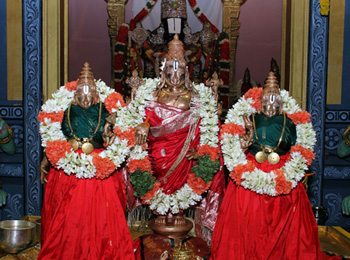Events
- Monday 8th Aug 2016
Kalki Jayanti Skanda Sashti Shravan Somwar Vrat
Kalki Jayanti marks the birth anniversary of Lord Vishnu in the coming future. Kalki is the tenth and the last incarnation of Lord Vishnu and appears at the end of Kali Yuga. A special puja is organized in Lord Vishnu temples on the occasion of Kalki Jayanti.
Skanda Sashti, Kanda Sashti Vratam 2016
Skanda Sashti
Skanda is a popular Hindu deity especially among Tamil Hindus. Lord Skanda is son of God Shiva and Goddess Parvati and younger brother of Lord Ganesha. God Skanda is also known as Murugan, Kartikeyan and Subramanya.
Sashti Tithi is dedicated to Lord Skanda. Devotees keep fast during Shukla Paksha Sashti day. For Skanda Sashti Vratam the day when Sashti Tithi is combined with Panchami Tithi is preferred. Hence Skanda Sashti Vratam might be observed on Panchami Tithi.
Skanda Sashti is also known as Kanda Shashti.When Panchami Tithi ends or Sashti Tithi starts between sunrise and sunset then both Panchami and Sashti are conjugated and this day is chosen for Skanda Sashti Vratam. This rule has been mentioned in Dharmasindhu and Nirnayasindhu. Many Murugan temples in Tamil Nadu, including famous Sri Subrahmanya Swami Devasthanam in Tiruchendur, follow the same rule and Soorasamharam day is observed one day before Sashti Tithi if on previous day Sashti Tithi is combined with Panchami Tithi.
Although all Sashti(s) are dedicated to Lord Murugan but Shukla Paksha Sashti during lunar month Kartika (which is during Solar month Aippasi or Karthikai) is the most significant one. Devotees observe six days fast which lasts on Soorasamharam day. Next day after Soorasamharam is known as Tiru Kalyanam.
Next Skanda Sashti after Soorasamharam is known as Subramanya Sashti which is also known as Kukke Subramanya Sashti and falls during lunar month Margashirsha.
Temples Dedicated to Lord Murugan
Following six abodes, which are known as Arupadaiveedu, are the most important shrines for Murugan devotees in Tamilnadu, India.
Palani Murugan Temple (100 km south east of Coimbatore)
Swamimalai Murugan Temple (Near Kumbakonam)
Thiruthani Murugan Temple (84 km from Chennai)
Pazhamudircholai Murugan Temple (10 km north of Madurai)
Sri Subrahmanya Swami Devasthanam, Tiruchendur (40 km south of Thoothukudi)
Thirupparamkunram Murugan Temple (10 km south of Madurai)
Marudamalai Murugan Temple (a suburb of Coimbatore) is another important shrine.
Kukke Subramanya Temple, near Mangalore, Karnataka, India is also very famous shrine dedicated to Lord Murugan but it is not part of six abodes of Lord Murugan which are located in Tamil Nadu.
Sawan Somwar Days in 2016
Sawan Somwar
In Hindu calendar Shravan month is dedicated to Lord Shiva. Whole month is considered auspicious to seek blessing of Lord Shiva. Devotees keep various fasts during Shravan month to please Lord Shiva.
Shravan month is also known as Sawan month in North Indian states. All Mondays or Somwar(s) which fall during Shravan month are considered highly auspicious for fasting and known as Shravan Somwar or Sawan Somwar Vrats. Many devotees observe sixteen Mondays or Solah Somwar fasting from first Somwar of Sawan month.
All Tuesdays or Mangalwar in Shravan month are dedicated to Goddess Parvati, the consort of Lord Shiva. Tuesday's fasting during Shravan month is known as Mangal Gauri Vrat. Sawan Shivaratri and Hariyali Amavasya are other auspicious days during Shravan month.There is fifteen days difference in starting time of Shravan month depending on the followed lunar calendar in the region. In Purnimant calendar, usually followed by North Indian states, Shravan month starts fifteen days before Amavasyant calendar.
In Andhra Pradesh, Goa, Maharashtra, Gujarat, Karnataka and Tamil Nadu, Amavasyant Lunar Calendar is followed while in North Indian states Rajasthan, Uttar Pradesh, Madhya Pradesh, Punjab, Himachal Pradesh and Bihar Purnimant Calendar is followed. Hence half of the Sawan Somwar dates differ in both calendars.
